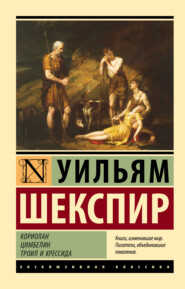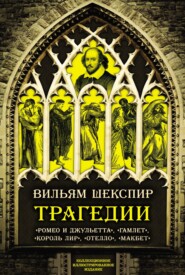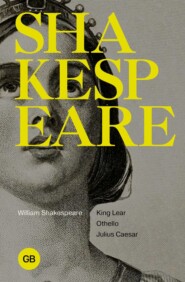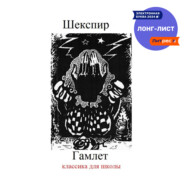По всем вопросам обращайтесь на: info@litportal.ru
(©) 2003-2025.
✖
King Henry the Eighth
Настройки чтения
Размер шрифта
Высота строк
Поля
To him that made him proud-the Pope.
NORFOLK. Let's in;
And with some other business put the King
From these sad thoughts that work too much upon him.
My lord, you'll bear us company?
CHAMBERLAIN. Excuse me,
The King has sent me otherwhere; besides,
You'll find a most unfit time to disturb him.
Health to your lordships!
NORFOLK. Thanks, my good Lord Chamberlain.
Exit LORD CHAMBERLAIN; and the KING
draws
the curtain and sits reading
pensively
SUFFOLK. How sad he looks; sure, he is much afflicted.
KING. Who's there, ha?
NORFOLK. Pray God he be not angry.
KING HENRY. Who's there, I say? How dare you thrust yourselves
Into my private meditations?
Who am I, ha?
NORFOLK. A gracious king that pardons all offences
Malice ne'er meant. Our breach of duty this way
Is business of estate, in which we come
To know your royal pleasure.
KING. Ye are too bold.
Go to; I'll make ye know your times of business.
Is this an hour for temporal affairs, ha?
Enter WOLSEY and CAMPEIUS with a commission
Who's there? My good Lord Cardinal? O my Wolsey,
The quiet of my wounded conscience,
Thou art a cure fit for a King. [To CAMPEIUS] You're
welcome,
Most learned reverend sir, into our kingdom.
Use us and it. [To WOLSEY] My good lord, have great care
I be not found a talker.
WOLSEY. Sir, you cannot.
I would your Grace would give us but an hour
Of private conference.
KING. [To NORFOLK and SUFFOLK] We are busy; go.
NORFOLK. [Aside to SUFFOLK] This priest has no pride in him!
SUFFOLK. [Aside to NORFOLK] Not to speak of!
I would not be so sick though for his place.
But this cannot continue.
NORFOLK. [Aside to SUFFOLK] If it do,
I'll venture one have-at-him.
SUFFOLK. [Aside to NORFOLK] I another.
Exeunt NORFOLK and
SUFFOLK
WOLSEY. Your Grace has given a precedent of wisdom
Above all princes, in committing freely
Your scruple to the voice of Christendom.
Who can be angry now? What envy reach you?
The Spaniard, tied by blood and favour to her,
Must now confess, if they have any goodness,
The trial just and noble. All the clerks,
I mean the learned ones, in Christian kingdoms
Have their free voices. Rome the nurse of judgment,
Invited by your noble self, hath sent
One general tongue unto us, this good man,
This just and learned priest, Cardinal Campeius,
Whom once more I present unto your Highness.
KING. And once more in mine arms I bid him welcome,
And thank the holy conclave for their loves.
They have sent me such a man I would have wish'd for.
CAMPEIUS. Your Grace must needs deserve an strangers' loves,
You are so noble. To your Highness' hand
I tender my commission; by whose virtue-
The court of Rome commanding-you, my Lord
Cardinal of York, are join'd with me their servant
In the unpartial judging of this business.
KING. Two equal men. The Queen shall be acquainted
Forthwith for what you come. Where's Gardiner?
WOLSEY. I know your Majesty has always lov'd her
So dear in heart not to deny her that
A woman of less place might ask by law-
Scholars allow'd freely to argue for her.
KING. Ay, and the best she shall have; and my favour
To him that does best. God forbid else. Cardinal,
Prithee call Gardiner to me, my new secretary;
I find him a fit fellow. Exit
WOLSEY
Re-enter WOLSEY with GARDINER
WOLSEY. [Aside to GARDINER] Give me your hand: much
joy and favour to you;
You are the King's now.
GARDINER. [Aside to WOLSEY] But to be commanded
For ever by your Grace, whose hand has rais'd me.
KING. Come hither, Gardiner. [Walks and
whispers]
CAMPEIUS. My Lord of York, was not one Doctor Pace
In this man's place before him?
WOLSEY. Yes, he was.
CAMPEIUS. Was he not held a learned man?
WOLSEY. Yes, surely.
CAMPEIUS. Believe me, there's an ill opinion spread then,
Even of yourself, Lord Cardinal.
NORFOLK. Let's in;
And with some other business put the King
From these sad thoughts that work too much upon him.
My lord, you'll bear us company?
CHAMBERLAIN. Excuse me,
The King has sent me otherwhere; besides,
You'll find a most unfit time to disturb him.
Health to your lordships!
NORFOLK. Thanks, my good Lord Chamberlain.
Exit LORD CHAMBERLAIN; and the KING
draws
the curtain and sits reading
pensively
SUFFOLK. How sad he looks; sure, he is much afflicted.
KING. Who's there, ha?
NORFOLK. Pray God he be not angry.
KING HENRY. Who's there, I say? How dare you thrust yourselves
Into my private meditations?
Who am I, ha?
NORFOLK. A gracious king that pardons all offences
Malice ne'er meant. Our breach of duty this way
Is business of estate, in which we come
To know your royal pleasure.
KING. Ye are too bold.
Go to; I'll make ye know your times of business.
Is this an hour for temporal affairs, ha?
Enter WOLSEY and CAMPEIUS with a commission
Who's there? My good Lord Cardinal? O my Wolsey,
The quiet of my wounded conscience,
Thou art a cure fit for a King. [To CAMPEIUS] You're
welcome,
Most learned reverend sir, into our kingdom.
Use us and it. [To WOLSEY] My good lord, have great care
I be not found a talker.
WOLSEY. Sir, you cannot.
I would your Grace would give us but an hour
Of private conference.
KING. [To NORFOLK and SUFFOLK] We are busy; go.
NORFOLK. [Aside to SUFFOLK] This priest has no pride in him!
SUFFOLK. [Aside to NORFOLK] Not to speak of!
I would not be so sick though for his place.
But this cannot continue.
NORFOLK. [Aside to SUFFOLK] If it do,
I'll venture one have-at-him.
SUFFOLK. [Aside to NORFOLK] I another.
Exeunt NORFOLK and
SUFFOLK
WOLSEY. Your Grace has given a precedent of wisdom
Above all princes, in committing freely
Your scruple to the voice of Christendom.
Who can be angry now? What envy reach you?
The Spaniard, tied by blood and favour to her,
Must now confess, if they have any goodness,
The trial just and noble. All the clerks,
I mean the learned ones, in Christian kingdoms
Have their free voices. Rome the nurse of judgment,
Invited by your noble self, hath sent
One general tongue unto us, this good man,
This just and learned priest, Cardinal Campeius,
Whom once more I present unto your Highness.
KING. And once more in mine arms I bid him welcome,
And thank the holy conclave for their loves.
They have sent me such a man I would have wish'd for.
CAMPEIUS. Your Grace must needs deserve an strangers' loves,
You are so noble. To your Highness' hand
I tender my commission; by whose virtue-
The court of Rome commanding-you, my Lord
Cardinal of York, are join'd with me their servant
In the unpartial judging of this business.
KING. Two equal men. The Queen shall be acquainted
Forthwith for what you come. Where's Gardiner?
WOLSEY. I know your Majesty has always lov'd her
So dear in heart not to deny her that
A woman of less place might ask by law-
Scholars allow'd freely to argue for her.
KING. Ay, and the best she shall have; and my favour
To him that does best. God forbid else. Cardinal,
Prithee call Gardiner to me, my new secretary;
I find him a fit fellow. Exit
WOLSEY
Re-enter WOLSEY with GARDINER
WOLSEY. [Aside to GARDINER] Give me your hand: much
joy and favour to you;
You are the King's now.
GARDINER. [Aside to WOLSEY] But to be commanded
For ever by your Grace, whose hand has rais'd me.
KING. Come hither, Gardiner. [Walks and
whispers]
CAMPEIUS. My Lord of York, was not one Doctor Pace
In this man's place before him?
WOLSEY. Yes, he was.
CAMPEIUS. Was he not held a learned man?
WOLSEY. Yes, surely.
CAMPEIUS. Believe me, there's an ill opinion spread then,
Even of yourself, Lord Cardinal.

















